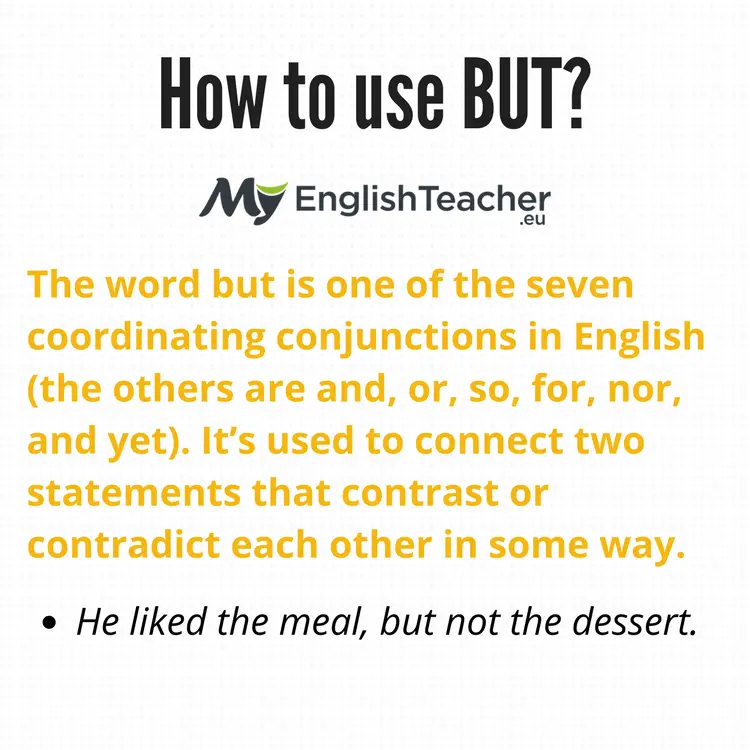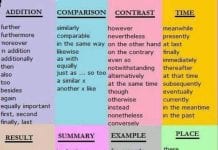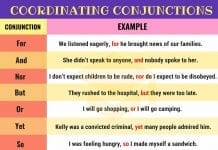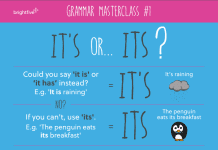
The word but is one of the seven coordinating conjunctions in English (the others are and, or, so, for, nor, and yet). It’s used to connect two statements that contrast or contradict each other in some way.
For example, learning English is difficult but fun! But getting into the specifics of such commonly used words can be tricky. This article will answer some questions you may have about how to use but.
When do I use a comma?
According to standard grammar, a comma is used before a coordinating conjunction to connect two independent clauses.
An independent clause is a clause with both a subject and a verb so that it can stand on its own. If the second clause does not contain a subject, then no comma is needed.
- He liked the meal, but not the dessert. (No comma)
- He liked the meal, but didn’t like the dessert. (No comma)
- He liked the meal, but he didn’t like the dessert. (Here, the subject is listed both times, making both clauses independent. A comma is appropriate.)
However, this is a rule that not many native speakers are aware of. Most people will place commas according to where they would naturally make a small pause while speaking.
When do I use “but rather”?
While but can be used to contrast two statements, it can also be used in the construction “not this but that.” For example:
- It wasn’t a drought but more of a dry spell.
This sentence is saying that whatever happened wasn’t a drought. Instead, it was a dry spell. To convey this idea, we use the conjunction but. We could also replace this with the phrase but rather.
- It wasn’t a drought but rather more of a dry spell.
The phrase but rather could also just be a combination of but and rather in their separate usages.
- You’d think he would break up with her face-to-face. But rather than doing that, he decided to do it over the phone. (Here, but is used as a contrast to the previous sentence, not in combination with rather.)
What’s the difference between “but” or “yet”?
But and yet are conjunctions with very similar meanings, and usually, when you can use the word yet, you can replace it with but.
The difference is that yet means something more like “despite that” or “regardless of that.” Grammatically speaking, it has a concessive meaning.
- He’s given her so many red flags, yet she still wants to be with him. (In other words, He’s given her so many red flags. Despite that, she still wants to be with him.)
- I attended every lecture in the class, and yet I still don’t understand anything. (It’s possible to use yet with and, making it more of an adverb than a conjunction.)
- Apparently, she keeps a calendar, yet she always forgets about the plans she makes.
In all these examples, you could probably replace yet with but and still have it make sense.
- He’s given her so many red flags, but she still wants to be with him.
- I attended every lecture in the class, but I still don’t understand anything.
- Apparently, she keeps a calendar, but she always forgets about the plans she makes.
The difference is that but only creates a simple contrast. If you really want to say, “This is true, but none of it really matters because…”, then yet is a much better way to convey that nuance.
When can I use “but” at the beginning of a sentence?
While you may have formally been taught that a sentence can’t begin with a conjunction, the reality is that you can begin any sentence with a conjunction. The two following examples basically mean the same thing:
- I’ll come with you and keep you company if you want. But I’m not going to enjoy it.
- I’ll come with you and keep you company if you want, but I’m not going to enjoy it.
Why make a clause with a conjunction its own separate sentence? It depends on how you like to break up your sentences.
Periods usually convey more of a break between ideas than commas do. You might also want to avoid run-on sentences that use too many commas.
When do I use “but also”?
The phrase but also is similar to but rather, but instead of meaning “not this but that,” it means “not just this but also that.” It’s used to add even more additional information than might be expected.
- They not only spilled beer all over the floor but also broke one of the lamps.
- You’re not just a mother but also a friend.
When using this phrase, be sure to create parallel constructions if you want to be grammatically correct. This means linking phrases of the same kind together.
In the following sentence, the placement of the word only makes it so that it connects nouns together, therefore making it a parallel construction.
- He doesn’t know only Spanish but also Portuguese and Italian.
This next sentence is incorrect because it connects a verb (“to know”) with nouns (“Portuguese and Italian”).
- He not only knows Spanish but also Portuguese and Italian.
When I can I use “but not limited to”?
You can use the phrase including but not limited to when you want to list some items in a category, but you also want to indicate there are many more besides that.
It basically means the same thing as the word including by itself but emphasizes the high amount of things in a given category. Usually, this phrase is found in legal contexts, maybe because the wording is more precise.
- The job involves many tasks, including but not limited to serving customers, checking inventory, cleaning the workspace, and taking phone calls.
- Natural language processing has a wide variety of applications, including but not limited to chatbots, language translation, sentiment analysis, and spell check.
- The book covers many topics, including but not limited to the Civil War, the Reconstruction Era, and Jim Crow laws.
What’s the difference between “but” and “although”?
This question is tricky because although can have two different usages.
The first is to mean “despite the fact that” or “even though,” which is like saying, “What I’m about to say doesn’t really matter.” In this case, the clause that although introduces will usually come before the main clause.
- Although it was scorching outside, we still decided risk sunburns and go hiking.
- Although I had a test the next morning, I decided to go out with my friends and ended up coming home late.
Then there is the second usage of although, which is to mean the same thing as but, except it tends to indicate more of an afterthought rather than a firm contrast.
This is usually when although comes after the main clause, which is how you’ll be able to tell the difference between the two meanings.
- I really didn’t want to go to the show, although it did end up being somewhat interesting. (This can be like saying, Now that I think about it, it was sort of interesting.)
- Mark’s thinking about transferring schools, although I’m not sure why. I thought he liked it here. (Using although instead of but indicates that the main topic is about Mark, not what the speaker thinks.)
If you want to create a contrast or transition between what you were just talking about and a topic that’s just as important, it might be better to use but instead of although, such as in this sentence:
- Mental illness can be difficult or awkward to talk about, but there are many ways we can be supportive.
The main point is not that mental illness is a difficult subject. Instead, the speaker is trying to transition into a topic they want to talk about. This makes but a much more appropriate choice than although.
What’s the difference between “but” and “except”?
Except (that) is another conjunction that means something similar to but, except it indicates more of an exception than a contrast (I just used it now!).
Maybe you want to state something that’s true except for one detail. In that case, except will help you convey that better than but.
- He and I are on good terms, except he still needs to pay me the money he owes.
- We have everything we need for dinner, except that I still need to buy oil.
- A: Everything’s fine, except…
B: Except what?
Don’t confuse this with the phrase except for, which is used as a preposition, not a conjunction. You can only follow it with noun phrases.
- Everyone submitted their entries on time except for him.
- He and I are on good terms, except for the fact that he still needs to pay me the money he owes.
Practice
Time for some practice! The following sentences each have an error in them. Try to spot them and see if you can correct them.
- It’s not the concerts themselves rather the social experience that I enjoy.
- I can teach you how to play many genres, including and not limited to jazz, rock, country, and the blues.
- He drives not only poorly but also can’t park properly.
- A lot of times, we follow rules, but don’t really understand why.
- He spent hours and hours more on the painting, but it still looks bad. (What could you replace but with to show that his work was useless?)
- Overall, the movie was great, but the ending could have been better. (What could you replace but with to indicate more of an exception?)
- Overall, the movie was great, but the ending could have been better. (What could you replace but with to indicate more of an afterthought?)
Answers:
- It’s not the concerts themselves but rather the social experience that I enjoy. (You need the whole phrase but rather, not just rather.)
- I can teach you how to play many genres, including but not limited to jazz, rock, country, and the blues. (“Including and not limited to” is not a standard expression.)
- He not only drives poorly but also can’t park properly. OR Not only does he drive poorly, but he also can’t park properly. (Either of these makes the sentence a parallel construction.)
- A lot of times, we follow the rules but don’t really understand why. (The second clause is not an independent clause, so you don’t need to use a comma.)
- He spent hours and hours more on the painting, yet it still looks bad. (Now, you can tell more how useless his effort was.)
- Overall, the movie was great, except the ending could have been better. (Now, it’s specified that the ending was really the one thing wrong with the movie.)
- Overall, the movie was great, although the ending could have been better. (Now, it sounds more like the speaker doesn’t care as much about the ending.)
























It is not “desert”, but “dessert”.
He liked the meal, but not the DESSERT”.